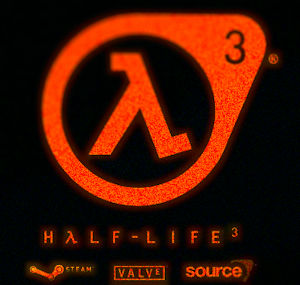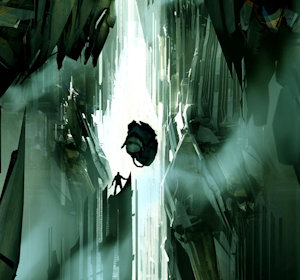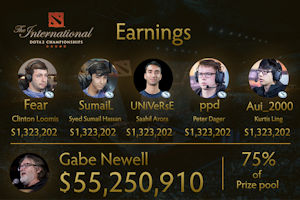How I Learned to Let Go of Half-Life 3
 | | Give it up |
I've been replaying the entire Half-Life series lately, including the masterful work-in-progress Black Mesa, a fan-made but Valve-supported overhaul of the first game. Naturally, between bouts of slapping down headcrabs with a crowbar or shooting Combine soldiers through the air with my OP gravity gun, I can't help but think about the future of the franchise. It's a rabbit hole I haven't explored lately, and with good reason. The behind-the-scenes saga of the whole thing is about as convoluted and mysterious as the mythos behind Gordon Freeman's dimension-hopping, portal-jumping journey through various alien invasions. For those of you new to the story--or for those of you who haven't been keeping up--it's quite an ordeal:
While Valve's Half-Life was certainly not the first game to try to tell a narrative story within the strict confines of a first-person shooter, it remains one of the best early examples of such an endeavor being done well. Its sequel, while again not exactly ground-breaking in its conception, is one of the most well-designed games ever made, so ahead of its time that it could be released as a new game today--over a dozen years after its actual release--and still be considered good. Half-Life 2 (in conjunction with Counter-Strike: Source) spawned one of the most popular and designer-friendly game engines of all time: the Source engine, a gaming tool with precision physics, high graphical yield, an evolving structure that only rarely broke backwards capability over the years, and a deceptively simple interface.
Half-Life 2 proved to be one of the most successful games of all time, earning it a place among the likes of Halo, Bioshock, and even Call of Duty as a landmark FPS that will always require mention in gaming history. Following its success, Valve announced a trilogy of episodic follow-ups. These "episodes" are best thought of as expansions of Half-Life 2, even though, technically speaking, they are wholly independent as software. Released a little over a year apart, the first two episodes were big successes, and fans waited eagerly for news of the third. After long delays, cagey interviews with developers and producers, and ever-shifting deadlines, the third episode simply never arrived. While it has never been officially cancelled, there were plans to develop a fourth episode that were eventually dropped, though the public only knows about that because the developers hired to create it eventually relented to public pressure and admitted they had moved on to other things. In effect, the last true entry in the Half-Life series, Half-Life 2: Episode Two (which ends on a massive cliffhanger, by the way), came out in October of 2007. It's been over ten years.
 | | Leaked concept art of Freeman meeting a Combine Harvester |
Valve absolutely refuses to talk about the subject of Half-Life's future. Despite being dogged by questions about a potential Half-Life 3 or about what happened to Half-Life 2: Episode Three, nobody within the company has been willing to give any concrete answers. Rumors and speculation abound, replete with half-verified leaks, out-of-context readings of unrelated statements made by game designers who may or may not have been involved with the series at one point, outright trolling from Valve employees, and the always reliable consideration of domain name registrations and copyright filings. Sufficed to say, until Valve makes an official announcement on the subject, anybody who claims to know what happened or what is happening with Half-Life is either wrong or lying. (If you want to get into the weeds on the matter, despite the counsel I'm about to offer you, a good starting point would be this compilation from the Half-Life Wiki.)
Here's what we do know, however: Valve is riding high on its development of Steam, the single biggest PC gaming platform in existence, which earns about $3.5 billion annually. The company still occasionally develops and releases games, but the focus is entirely on multiplayer, including the ludicrously popular Dota 2, which reportedly earns them somewhere along the lines of $18 million a month. Indeed, not counting The Lab, which is nothing more than a series of (admittedly cool) VR tech demos, Valve hasn't released a single-player game since Portal 2 in 2011, and even that game heavily featured its multiplayer cooperative mode. In other words, despite fans consistently clamoring for more Half-Life, there isn't much financial incentive for Valve to devote time and resources to such a project.
My advice to fans, then, is this: let it go. I know it's hard. I know you've devoted years of your life imagining what the next Half-Life game could be. I know you've given thought to what will happen when Gordon and Alyx finally reach the Borealis. I know you want answers about the G-Man. But seriously, let it go.
 | | There's no way a new Half-Life could earn this kind of money on a regular basis |
I'm not saying it won't happen someday. In fact, gun to my head, I'd say it's inevitable that, eventually, we'll get our Half-Life 3. I just don't think Valve is currently developing it with any kind of gusto (if it's developing it at all), and when it finally does happen, Half-Life 3 won't be anything like what you've built up in your mind. Look at the history of highly anticipated games that go through these kinds of droughts, games like Too Human and Duke Nukem Forever. When these games finally got their day in the sunshine after years of limbo, they wilted faster than Nosferatu in the summertime. At this point, we have to assume the next Half-Life will be just like that.
I'm not saying this to you out of bitterness or spite. I'm not even saying it just because the precedents for enormous disappointment are overwhelming. No, I'm saying it because I have evidence to back myself up.
Let's start with Marc Laidlaw, the guy who wrote Half-Life and Half-Life 2 (and remained the lead writer for the subsequent episodes). He retired from Valve in January of 2016. Sure, you don't need him to make another Half-Life game, and in theory, if one is being developed, it's entirely possible the story was already complete enough by the time he left the company (though if you know anything about how games are produced, you know how slim that possibility really is). That would leave his co-writers for the episodes, Erik Wolpaw and Chet Faliszek, to finish the job. Wolpaw left Valve in February of 2017, and Faliszek left in May of 2017. The chances that any of these three guys could make a significant contribution to the next Half-Life game get exponentially worse as time passes, which means that new writers would have to be brought on to patch things up or restart from scratch. New writers necessarily equate to a different story, and thus, the next Half-Life just won't feel the same.
 | | I'm not here to disparage Gabe--he's an entrepreneurial success story--but these things don't just screw themselves |
In addition to the different narrative style, interviews with Valve co-creator and managing director Gabe Newell suggest an entirely different approach to game design itself. In 2011, after writer Geoff Keighley famously stated that Valve would effectively be done with single-player gaming after Portal 2 (a prediction that has proven pretty accurate thus far), Newell talked about the need for "social components" in all their games and that the only single player games they are interested in are "single player plus" games, meaning that a multiplayer component of some sort is essential to the experience. (If you want to know how I feel about this, check the top of the page and the title of the blog.) Newell went on to elaborate that the "episodic model" has been thrown out in favor of a game model where a single game is constantly tweaked and changed over time. This mentality seems to indicate that hopes for a game with a coherent narrative structure are falling by the wayside in favor of never-ending battle simulators like Left 4 Dead and Dota 2. In other words, no more Gordon Freeman.
Still, hunger for Half-Life 3 has continued unabated in the intervening years, fueled in part by cryptic and occasionally mean-spirited efforts by Valve employees to keep the dream alive, even if it's little more than a recurring joke for them. Fans can be as sour or as angry as they want--and a quick visit to certain Steam forums will show you how far some fans have taken this--but the fact remains that Valve, as it currently stands, is one of the most successful game developers out there, and it has gotten that way by chasing profit, not the dreams of fans. I know Newell would have you believe that Valve is this "flat" and "independent" company where everybody is equal and corporate greed is frowned upon in favor of utopic socialist idealism, but at the end of the day, Newell is the wealthy head of a booming business (his own net worth is an estimated $5.5 billion, which is over two billion dollars higher than Donald Trump's), and his interests are in doing what's best for the company (which is, I rush to point out, an LLC and not a social commune). Unfortunately, the current evolving/multiplayer/"freemium" model is far more rewarding in that regard than devoting years to developing a single-player game that is good for just one transaction with no future on the esports tournament circuit.
What I realized is that letting yourself be hyped for Half-Life 3 is only opening yourself up for pain. Whether it be at the hands of Valve employees trolling you, Gabe Newell breaking promises you think he made, the inexorable passage of time, or the inevitable disappointment that comes from waiting so long for something that it can never live up to your expectations, you are just asking to be hurt. Let it go. There are other games out there that deserve your attention, and other developers that deserve your support.
-e. magill 1/25/2017
| MORE LIKE THIS: |

|
Alien: Isolation
Does Alien: Isolation recapture the terror of Ridley Scott's classic film, or is it dead in space? [11/3/2014]
|
|
|
|
|